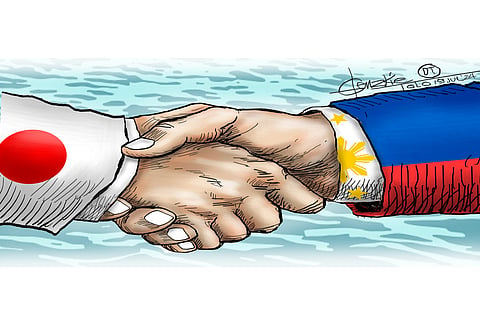
- NEWS
- the EDIT
- COMMENTARY
- BUSINESS
- LIFE
- SHOW
- ACTION
- GLOBAL GOALS
- SNAPS
- DYARYO TIRADA
- MORE

As the United States’ reliability in the Far East wobbles, Japan is stepping in to fill its shoes and provide security that is more accessible to Asians than having to go halfway around the world for it.
The imminent second Donald Trump era is making the world adjust their expectations of the US since the first iteration revealed an inward-looking administration, in which international commitments were secondary.
The recent signing of the country’s strategic alliance with Japan, the second after the US for the Philippines, came just in time as a second Trump presidency looms.
Many are betting that while Trump will keep the economic pressure on China primarily to secure more access for US products in the huge Asian market, a Trump administration would be willing to compromise on regional security arrangements.
Japan is undergoing a fundamental shift in its involvement and willingness to take on a leadership role in the region.
Unlike its rival power, Japan uses its economic muscle to help nations in the region attain a self-sustaining economy.
It has been the widespread experience in the region of economic muscles being flexed and financial lifelines extended to keep small nations subservient to one country’s objectives.
The recently signed Reciprocal Access Agreement (RAA) with Japan has features similar to the Enhanced Defense Cooperation Agreement with the United States, opening the signatory countries to mutually developing defense capabilities.
It will primarily lift restrictions on military exchanges between the Armed Forces of the Philippines and the Japan Self-Defense Forces.
The Philippines is always on the frontlines of security issues in the region because of geography, which makes it in the interest of other nations to strengthen the country’s capabilities.
The pact with Japan becomes extremely important because of the likelihood of a substantial reduction in US forces in the region after the November elections.
The agreement allows for the holding of “joint military exercises and disaster relief operations” both in the Philippines and Japan.
Before the signing of the RAA, Japanese troops could only participate in humanitarian assistance and disaster relief missions and act as observers in joint military exercises, such as the annual “Balikatan” with the US.
Japan has a pacifist Constitution that bars any involvement in an armed conflict outside of its territory but it is not forbidden to provide training and extend military assistance.
The strategic alliance was brought about by necessity due to similar territorial challenges in which the 2016 Permanent Court of Arbitration ruling has a great bearing.
In signing the pact, both nations underlined the need for the international community to speak out on the importance of maintaining and strengthening the free and open international order based on the rule of law.
Both nations branded the recent face-off over a supply mission to the grounded BRP Sierra Madre as obstructing freedom of navigation and disrupting supply lines, “thus increasing tensions.”
Ministers of the partner countries met to draft a program of deterrence primarily through joint patrols to maintain a military equilibrium.
The ministers emphasized that both trilateral and multilateral cooperation grant nations the ability to uphold international peace and security through shared values.
China has made known its position that Asians should decide their future, which is what the new alliance will make possible.
Another wish of the arm-twisting nation is that those involved in territorial spats should not allow third-party intervention, which the new alliance of protagonists of the Asian giant meets.
A Code of Conduct among the members of the Association of Southeast Asian Nations and Japan may even be better, rather than waiting for the expansionist nation to make up its mind to sign a binding deal.
